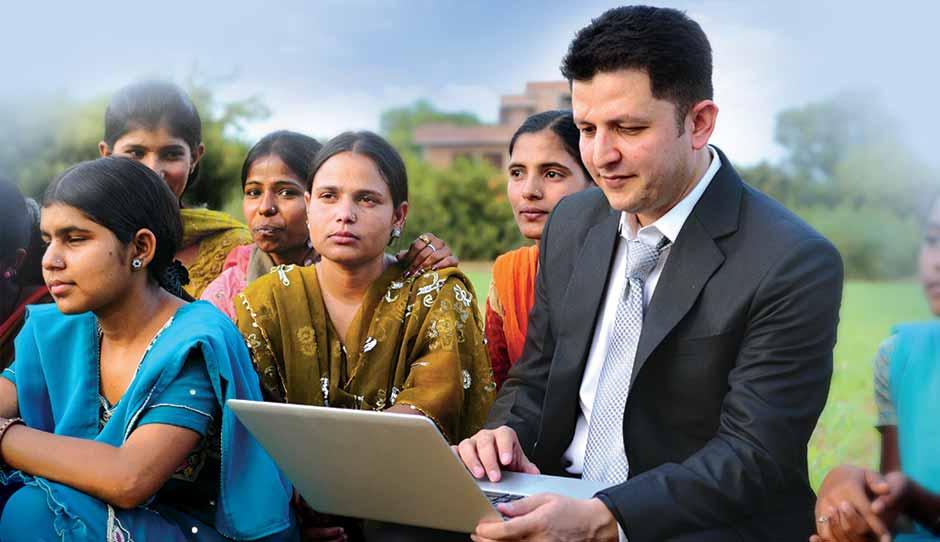How a BPO is Leveraging Rural India's Growth Opportunity
- BY Nikita Saxena
 In Strategy
In Strategy 12122
12122 0
0

Ajay Chaturvedi, founder and CEO of HarVa, is amazed that others can’t see what he does—incredible business opportunity in villages across India. According to this banker-turned-entrepreneur, these untapped villages can also be the key to helping India regain its footing in a sector of the economy that helped create many jobs—BPOs.
The global BPO market—valued at $120-150 billion—is said to grow 15 per cent per year. Yet, over the past few years, competitors from China and Philippines have threatened to topple India’s position as the world’s premium provider of low cost BPO services. Although, according to Nasscom, India grew its market share within the global industry from 51 per cent in 2009 to 58 per cent in 2011, and accounts for nearly 7.5 per cent of the GDP, several western clients who predominantly farmed out work to India are now being forced to take their work elsewhere as input costs rise dramatically here.
“Most people haven’t cracked through tier II cities,” Chaturvedi says of the foreign clients who find outsourcing to urban India too expensive, and the recruiters who only consider tier I and tier II cities when staffing their firms. “If we don’t look at rural India soon,” he warns, “we may lose our competitive advantage.”
The business sweet spot lies here, he says. Which is why HarVa, (derived from the Hindi word for green that signifies prosperity), and short for “harvesting value” sources talent from the villages—where, according to Chaturvedi, there are nearly 130 million rural skilled workers who are unemployed due to lack of opportunity.
When you work in a rural setting, you have to embellish it with other parallel lines of businesses to make it viable." - Ajay Chaturvedi
All successful businesses segment customers. Chaturvedi has done those studies on his employees instead. His initial pilots in Teekli, a village off Gurgaon’s Sohna road, showed the really untapped demography were rural women. “They wouldn’t jump jobs, are truly appreciative of a chance to work, and are committed.”
So, since launching in early 2010, HarVa has built up a 300-odd all-women team for its four rural centres in Haryana, Rajasthan and Andhra Pradesh. In these centres, women who are trained for free by HarVa, work on mostly non-voice outsourcing projects for a clutch of international clients. Each one of them earns between Rs4,000-Rs7,000. Before you can even congratulate his do-good women champion’s role, Chaturvedi makes it apparent he steers clear of politically charged descriptives such as women’s empowerment. “We hire them because they’re smart, efficient and capable.”
Chaturvedi, at a TEDx Event at Amsterdam University College talking about the the power of cost effective innovation on all aspects that will lead to value creation across the world.
Chaturvedi, a BITS Pilani alumnus, and an MBA from Wharton School of Business, is confident of healthy growth despite the slow beginnings. From his current base, he wants to grow HarVa to 2,000 women by 2013-end. “We should have 10,000 women across 50 centres in 10 states by 2015.”
Yet HarVa’s aim isn’t to be “just a BPO”. That is only the starting point, says Chaturvedi. His rural centres are designed to evolve into “perfect information hubs” for the village community. So, HarVa offers farming help desks, microfinance initiatives and career counselling at its BPOs. This integrated approach differentiates him from other rural BPO firms, he claims. “I don’t believe that a rural BPO can follow a linear business model like an urban BPO. It can’t just be built on cost arbitrage. When you work in a rural setting, you have to embellish it with other parallel lines of businesses to make it viable.”
Indeed, the HarVa model is gaining attention at home and abroad. London School of Business recently did a case study on the company too. Of course, there are challenges to working in villages, the most crippling of which is power supply. The second is simply convincing villagers that HarVa is for real. “They think you are there to either use or mislead them,” Chaturvedi explains. “But once we break through that barrier of mistrust,” he says, “it is easy enough.”





























Add new comment